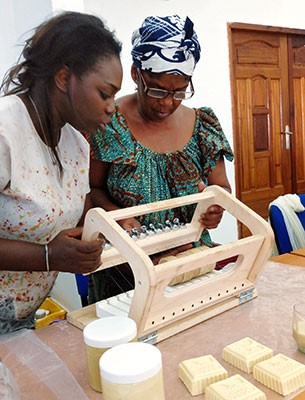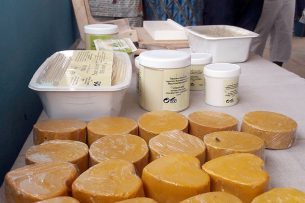
Formula for global change from the ground up: two women in C?te d¡¯Ivoire show the way
On 13 April 2018, the 51³Ô¹Ï Department of Economic and Social Affairs issued the third report of the . This analytical report, which was mandated by the Addis Ababa Action Agenda, takes stock of the progress countries, financial institutions and other relevant parties are making toward financing the Sustainable Development Goals.
The report points out that women are often denied access to credit, taxed unfairly and under-represented in policymaking. Gender equality needs to be mainstreamed in fiscal policies, business, access to finance, and development cooperation, and all financing policies need to be monitored and assessed consistently for gender impacts. Improving access to finance for women can enable them to establish sustainable livelihoods, as was done for two women in C?te d’Ivoire.

Blah Pauline Ninhouet during a soap-cutting exercise with UN Women expert, Mame Khary Diene. Photo: UN Women/Alpha Ba
When world leaders gathered in Addis Ababa in 2015, the goals they set out included ending extreme poverty and mitigating climate change by 2030. To achieve the goals, 17 in all, they envisioned governments, financial institutions and policymakers devising new ways of doing business. And this new way would have to be inclusive, sustainable and innovative to be successful. Blah Pauline ±·¾±²Ô³ó´Ç³Ü±ð³Ù¡¯²õ name did not come up in the negotiations, but her story embodies what sustainable development means and how it can work when partners share resources.
For years, Blah Pauline Ninhouet, 60, and her four daughters struggled to produce shea butter using the traditional method. As the lone breadwinner in the family, she needed to feed, house and clothe her children and send them to school. Her earnings were paltry.
In C?te d’Ivoire, women make up almost 70 per cent of the agricultural labour force, but only 3 per cent of women own the land that they cultivate, according to the National Institute of Statistics.
“I was at the lowest of lows, at the very bottom, when I found this UN Women programme,¡± says Ninhouet, from Korhogo, a region in the northern part of C?te d’Ivoire. She is referring to a climate-smart agricultural programme launched in early 2017 by UN Women in partnership with the Ministry of Family, Child Protection and Solidarity and funded by the government of Japan.
Today, Ninhouet is dreaming big. She plans to open a business to sell organic shea butter-based cosmetics.
Producing shea butter is largely seen as women¡¯s job, and it¡¯s a hard job. Since the traditional method used to produce shea butter is labour-intensive and the resulting product doesn¡¯t meet international quality standards, the profit margin is low. This is compounded by rising deforestation, a major threat to the sector.
Since October 2017, UN Women has trained 300 women from various cooperatives in Korhogo in better manufacturing practices, and has improved the equipment in shea butter production facilities so that the products meet competitive standards. By October 2018, the programme aims to reach more than 1,200 women across C?te d’Ivoire. In addition, the programme also provides financing and market access for women in the shea sector.

Improved equipment in shea butter production facilities ensures that the products meet competitive standards. Photo: UN Women/Alpha Ba
“Today, I find myself dreaming of things I couldn¡¯t dream of before…We no longer see ourselves as poor women trying to survive with the meager income we derived, using the traditional method of producing shea butter. Now, we can sell our produce as natural cosmetics in the market. And soon, when we have the certification, it will be even better,” says Lydie Kambou, President of the Bouna Women’s Cooperative,?pictured at the top. (Photo: UN Women/Alpha Ba)
The organic certification, which the programme is ensuring, will go a long way towards increasing the value of the shea butter.
Following the launch of the in C?te d’Ivoire by President Alassane Ouattara this year, the village Chief of Bouna, where Lydie Kambou lives, donated 25 hectares of land to the women working in the shea sector¡ªa significant step towards protecting the land and shea trees from deforestation, and increasing local women¡¯s production capacity.
±·¾±²Ô³ó´Ç³Ü±ð³Ù¡¯²õ , one of the members of the Inter-agency Task Force on Financing for Development.

Follow Us